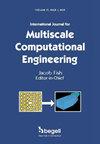Computational Framework for Prediction of Cardiac Disorders by analyzing ECG signals Using Machine Learning Technique
IF 1.4
4区 工程技术
Q2 ENGINEERING, MULTIDISCIPLINARY
International Journal for Multiscale Computational Engineering
Pub Date : 2023-01-01
DOI:10.1615/intjmultcompeng.2023050106
引用次数: 0
Abstract
The clinical diagnosis of heart disorders relies heavily on electrocardiograms (ECGs). Numerous abnormalities in heart are being identified with a record of heart signal throughout intervals. This paper presents a novel computational framework for detecting heart disorders by analyzing the ECG signals using machine learning technology. Monitoring and diagnosing ECGs signals in daily life are appearing recently due to an increase in healthcare equipment. Monitoring ECG signals is a crucial area of research because it enables early detection of catastrophic heart problems in people. Since conventional signal identification only considers one reference beat for identifying ECG signals, each individual's detection rate varies. In this paper, field-programmable gate array (FPGA) is employed to speed up ECG signal diagnosis and measure appropriate outcome to demonstrate that suggested ECG diagnosis algorithm is appropriate for hardware acceleration. The ECG diagnosis algorithm rapidly determine reference beats that change depending on person and analyze each person's signal executed at FPGA in real-time. In this paper, Noise removal from input ECG data set is performed by adaptive filter technique and base line wander is also removed. Machine learning in ECG classification is done by Artificial Neural Network (ANN) that allows to use less energy while still providing accurate classification. MATLAB software is employed to carry out this work and corresponding outputs are obtained for ECG classification.利用机器学习技术分析心电信号预测心脏疾病的计算框架
心脏疾病的临床诊断很大程度上依赖于心电图(ECGs)。许多心脏异常都是通过记录心脏信号来确定的。本文提出了一种利用机器学习技术通过分析心电信号来检测心脏疾病的计算框架。近年来,随着医疗设备的增多,对日常生活中的心电图信号进行监测和诊断也逐渐出现。监测心电图信号是一个至关重要的研究领域,因为它可以早期发现人类的灾难性心脏问题。由于传统的信号识别只考虑一个参考拍来识别心电信号,每个人的检测率都不一样。本文采用现场可编程门阵列(FPGA)对心电信号进行加速诊断,并测量相应的结果,以验证所提出的心电诊断算法适合硬件加速。心电诊断算法可以快速确定随人变化的参考心跳,并对FPGA上执行的每个人的信号进行实时分析。本文采用自适应滤波技术对输入心电数据集进行降噪,同时消除基线漂移。心电分类中的机器学习是由人工神经网络(ANN)完成的,它可以在提供准确分类的同时使用更少的能量。利用MATLAB软件进行这项工作,得到相应的输出用于心电分类。
本文章由计算机程序翻译,如有差异,请以英文原文为准。
求助全文
约1分钟内获得全文
求助全文
来源期刊
CiteScore
3.40
自引率
14.30%
发文量
44
审稿时长
>12 weeks
期刊介绍:
The aim of the journal is to advance the research and practice in diverse areas of Multiscale Computational Science and Engineering. The journal will publish original papers and educational articles of general value to the field that will bridge the gap between modeling, simulation and design of products based on multiscale principles. The scope of the journal includes papers concerned with bridging of physical scales, ranging from the atomic level to full scale products and problems involving multiple physical processes interacting at multiple spatial and temporal scales. The emerging areas of computational nanotechnology and computational biotechnology and computational energy sciences are of particular interest to the journal. The journal is intended to be of interest and use to researchers and practitioners in academic, governmental and industrial communities.

 求助内容:
求助内容: 应助结果提醒方式:
应助结果提醒方式:


